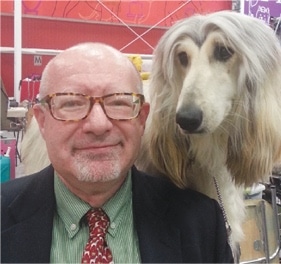What Does ‘Paying Your Dues’ Mean in Our Sport?
Recently, a post on Facebook in one of the groups for new exhibitors asked what long-time breeders meant when they said they expected newcomers to “pay their dues” in the sport. The tone of the post was defensive, suggesting that those who used the phrase were gatekeepers, unwilling to share their better dogs with people coming up through the ranks.
I beg to differ.
Smart breeders recognize that one of our most important duties, to keep the sport thriving, is to identify, encourage, and mentor dedicated novices. Most of us started with less-than-stellar specimens but it was how we advanced—taking handling classes, learning from knowledgeable breeders, sticking around for a few years until we proved ourselves worthy of a co-ownership on a better-quality dog—that showed we were willing to pay our dues. Objectively looking at why our dog placed third or fourth at a particular show adds to our canine education; blaming the judge or claiming it was politics is an easy out that accomplishes nothing.
Smart breeders recognize that one of our most important duties, to keep the sport thriving, is to identify, encourage, and mentor dedicated novices.
It may sound old-fashioned in our tough, hard-edged, high-tech world, but courtesy and good manners still go a long way in impressing established breeders. We want to see a genuine interest in our breed, a desire to learn, and the willingness to accept a successful breeder’s opinion.
You will always learn more taking home the third pick puppy from a consistent litter than the one promising puppy from an otherwise mediocre litter. That’s the puppy to take to handling class, practice your grooming and trimming on, and work with under the breeder’s watchful eye.
Knowledge of pedigrees and bloodlines will not be expected of a buyer who goes to a long-time breeder for a healthy, well-socialized companion puppy. But if you’re brand new, have never finished a dog to its championship, and don’t even know if you are fully committed to the sport, don’t flash a checkbook at a breeder and demand their best, a puppy of the quality that it may have taken them 40 years to produce.
I have heard a few newcomers claim that if they don’t come on strong and play hardball with a successful breeder, they are sure to get taken advantage of. They couldn’t be more wrong. That pushy attitude only warns a breeder that such a buyer is impatient, impossible to please, and never the right home for one of their puppies.
About 30 years ago, a lovely family came to me for a nice puppy. Although Mom was impressed by the big dog show rosettes hanging on my walls, she wisely understood that with young children to care for, showing dogs might be a hobby for a later time.
Mom phoned regularly and sent photos—back in those pre-Internet days—asking questions about the breed, and when their dog came back to me a few times a year for boarding, I was always impressed that she was beautifully groomed, nails cut, teeth clean, and in good weight, which isn’t necessarily the case with every dog in a great pet home. Mom also asked about what dog shows I was attending and joined me on occasion, helping to groom dogs and hold them at ringside.
After a few years, the family’s oldest child got his driver’s license, the other kids had grown more self sufficient, and Mom had more time to cultivate her own hobbies and interests. The family was ready for a second dog, this time a definite show prospect that we would co-own. Although Mom had attended handling classes and knew what to do, she still felt shy about stepping into the ring herself. I put half the dog’s points on him, then told her she needed to finish him herself. She accepted the challenge, and got less self-conscious each time she showed. She finished him beautifully.
Eventually, the family purchased a third dog from me, that Mom finished as well. What a protégé she turned out to be, putting titles on dogs of my breeding, serving on the Board of her local kennel club, and at one point even editing the regional breed club’s newsletter. She discovered her passion at just the right time to do it justice, and our breed gained a valuable fancier who continues to contribute, three decades later.
I don’t believe I did any more than other dedicated breeder-exhibitors would have to foster this owner’s ongoing interest. I do know that when I think of a novice paying her dues, this mom serves as a shining example. By contrast, had she tried to bully me, impress me or wear me down, she would not have gotten a puppy nor my ongoing mentorship—the value added that comes with choosing a good breeder.
Paying your dues is part of life. You don’t get the big corner office without doing the spade work, and you aren’t likely to get a promising puppy from a great breeder without doing the appropriate research and prep work.









